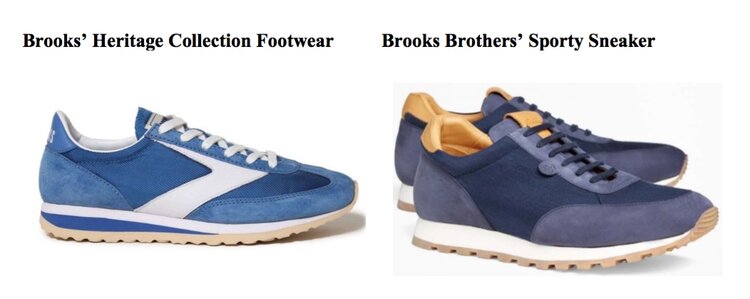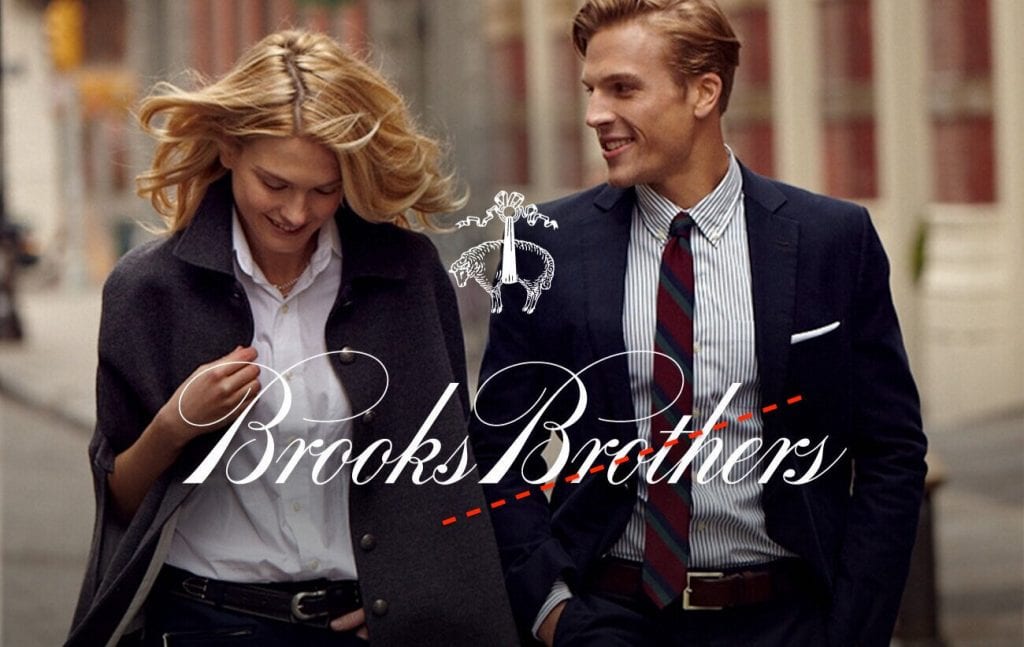Brooks Brothers is looking to drop the “Brothers” from its name. That was the apparent takeaway to be garnered from the application for registration that the 201-year old apparel company, the oldest men’s clothing company in the U.S., filed with the U.S. Patent and Trademark Office (“USPTO”) late last year between the rush of the Christmas holiday and the festivities of the New Year. According to the application that counsel for Brooks Brothers quietly filed on December 30, the company is seeking registration for its impending use of the word “Brooks” on its own.
In its trademark application, Brooks Brothers sets out eight different classes of goods/services for which it aims to use the simplified “Brooks” name – from jewelry and eyewear to handbags and travel bags. Absent from the list of goods and services for which New York-based Brooks Brothers is seeking a registration? Footwear. Its decision to veer away from shoes, even though it sells an array of boots, loafers, sandals, and sneakers, including “Sporty” ones, has not stopped a like-named rival from stepping in and filing a lawsuit.
By way of a complaint filed on February 10, Brooks Sports has asked a federal court in Washington to step in “to stop Brooks Brothers from using Brooks’ famous BROOKS trademark on [its] stores and products, and [to] prevent public confusion and dilution of the BROOKS mark.” According to Brooks Sports’ suit, Brooks Brothers’ is in the midst of attempting to “re-brand” and “enter into the active lifestyle and athletic footwear, apparel and accessories market” by selling “new products that differ from its traditional offerings.”
The problem with that, according to Brooks: in doing so, Brooks Brothers is likely to damage its similarly-monikered rival by “confusing the public [about the source of its products], diluting the BROOKS marks, [and] ridding on Brooks’ coattails.”
All the while, Seattle-based Brooks – which was founded in 1914 and later acquired by billionaire Warren Buffett’s multinational holding company Berkshire Hathaway – claims that Brooks Brothers has waged a campaign to prevent it from “obtaining registrations for its BROOKS trademark in the United States and other countries, despite decades of unopposed use.”
Beyond the relatively straightforward trademark infringement and dilution asserts – and the trade dress infringement claim (which centers on Brooks’ Heritage sneaker and Brooks Brothers’ Sporty sneaker) – that Brooks makes in connection with Brooks Brothers’ impending attempts to rebrand is a more interesting assertion: one that centers on a behind-the-scenes deal that the two like-named brands entered into 40 years ago.

On the heels of a “dispute” in November 1977 when Brooks Brothers sought to oppose the registration of Brooks Sports’ “BROOKS” trademark with the USPTO for use on athletic shoes, the two parties settled their differences and entered into a formal and legally-binding agreement “of indefinite duration.”
According to Brooks’ complaint, “On or about January 16, 1980, Brooks and Brooks Brothers executed an agreement resolving [Brooks Brothers’] opposition.” In that agreement, Brooks was “granted the right to use BROOKS-formative marks for all athletic and athletic-related clothing, with a narrow exception for golf related clothing, and granted Brooks Brothers the right to use BROOKS BROTHERS-formative marks on clothing other than athletic shoes and apparel, with an exception for golf polo shirts.”
In particular, Brooks asserts, “Brooks Brothers agreed in Section (1) of the agreement not to ‘object to the use and registration by [Brooks] for the entire world of the [trademark] BROOKS or BROOKS SHOES in connection with any type of athletic shoe.’”
As a result of that agreement and given their distinct offerings (“Brooks is known for athletic-inspired innovative footwear, apparel and accessories under its famous BROOKS mark, [while] Brooks Brothers is known for its traditional ready-to-wear fashion apparel and tailored business and formal wear under its BROOKS BROTHERS mark”), Brooks claims that they “have coexisted without a likelihood of confusion for over one-hundred years … selling their respective goods and services under their respective marks in different markets to different customers who have different objectives in purchasing the parties’ respective products.”
That changed in 2018 when Brooks Brothers initiated a new opposition with the USPTO.
In early October 2018, Brooks Brothers allegedly breached the parties’ agreement by filing an opposition with the USPTO that sought to prevent Brooks’ pending application for the mark BROOKS for use of “athletic footwear” and “athletic clothing” from being registered. The timing was hardly coincidental it seems, as Brooks alleges that beginning in 2018, “Brooks Brothers began to enter the athletic footwear market.”
While the two companies attempted to make peace, Brooks claims that such efforts were “unsuccessful.” Matters were made worse, the footwear company claims, as “just days after the discussions between the parties regarding the opposition failed, Brothers filed [its December 2019] federal trademark application for BROOKS” for use “in connection with … all-purpose sport bags and retail store services and online retail store services featuring clothing and sporting goods,” among other goods and services.
Taken together, Brooks claims that Brooks Brothers’ opposition and pending trademark applications, and its “bona fide intent to expand its presence in the athletic and active lifestyle [market]” by way of products that are “identical, similar, overlapping or related to Brooks’ athletic and active lifestyle footwear, apparel and accessories,” are part of a larger scheme to “trade on the goodwill of Brooks’ BROOKS Marks, cause confusion and deception in the marketplace, and divert potential sales of Brooks’ athletic and active lifestyle footwear, apparel and accessories to [itself].”
With this in mind, Brooks sets forth claims of trademark infringement and dilution, trade dress infringement, unfair competition, and breach of contract, and asserts that “Brooks Brothers’ acts are threatening to cause and causing, and unless restrained, will cause and continue to cause damage and immediate irreparable harm to Brooks and to its valuable reputation and goodwill with the consuming public.”
The Brooks-centric suit is not the first to come about in connection with an agreement between two like-named brands to make the peace. In July, Valentino S.p.A. filed suit against Mario Valentino, arguing that the similarly named brand was running afoul of the co-existence agreement they entered into in 1979 due to the fact that they have “similar names and overlapping goods” and “experienced issues of consumer confusion” as a result.
According to that agreement, which the similarly-named fashion brands agreed to forge due to their respective “desire to avoid public confusion and conflict, present or future, in any part of the world,” Mario Valentino is permitted to “use and register the full name Mario Valentino or M. Valentino or Valentino or the letters MV or V exclusively on the outside, together with Mario Valentino on the inside and on the packaging [of] all goods made of leather or imitation leather or other material.”
That agreement served its peace-making purpose for nearly 4 decades, but as of this past summer, the Valentino Garavani-founded Valentino S.p.A. accused Mario Valentino and its American licensee of “actively engaging in a campaign to trade off Valentino’s goodwill in the United States handbag market,” and breaching their agreement in the process. That case is still underway.
*The case is Brooks Sports Inc v. Brooks Brothers Group Inc, 2:20-cv-00207 (W.D. Wash.).














